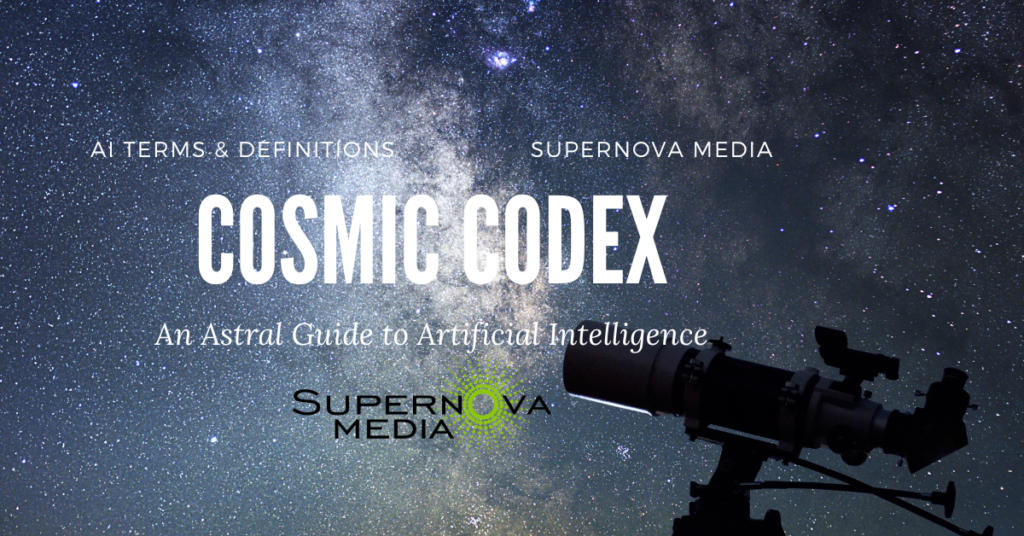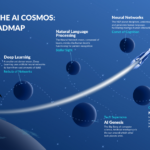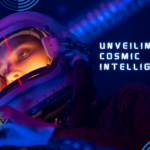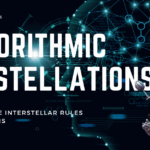|
Getting your Trinity Audio player ready...
|

Greetings, stargazers! Are you ready to embark on a fantastic voyage through the starlit realm of Artificial Intelligence (AI)? Much like celestial bodies guiding seafarers across vast oceans, Supernova Media is here to illuminate your way through the AI galaxy.
Imagine, if you will, each AI term as a celestial body. Some, like “Artificial Intelligence” and “Machine Learning,” are as familiar as Mars and Venus, our neighboring planets. Others, like “Deep Learning” and “Neural Networks,” might seem as distant and mysterious as the swirling storms of Jupiter or the icy rings of Saturn. Fear not, though, for our cosmic codex will serve as your trusty celestial map, helping you navigate the intricate constellations of AI terms and definitions.
- Artificial Intelligence (AI): A field of computer science dedicated to creating machines and software that can perform tasks requiring human-like intelligence.
- Machine Learning (ML): A subset of AI where machines learn from data and improve their performance without being explicitly programmed.
- Deep Learning: A subfield of ML that uses neural networks with many layers (hence “deep”), enabling the learning of complex patterns from large amounts of data.
- Neural Network: A system of algorithms structured similarly to the human brain, designed to recognize patterns.
- Supervised Learning: A type of machine learning where models are trained on a labeled dataset, i.e., the correct output is known and used for learning.
- Unsupervised Learning: A type of machine learning where models find patterns in an unlabeled dataset, i.e., the correct output is not known during training.
- Reinforcement Learning: A type of machine learning where an agent learns to make decisions by taking actions in an environment to maximize reward.
- Natural Language Processing (NLP): A field of AI that focuses on the interaction between computers and humans through natural language.
- Computer Vision: A field of AI that trains computers to interpret and understand the visual world.
- Predictive Analytics: The use of data, machine learning techniques, and statistical algorithms to predict future outcomes based on historical data.
- Chatbots: AI software designed to interact with humans in their natural language, often used in customer service.
- Algorithm: A set of rules or instructions given to an AI, ML model or computer to help it learn and solve problems.
- Data Mining: The process of discovering patterns in large data sets involving methods at the intersection of machine learning, statistics, and database systems.
- Robotic Process Automation (RPA): The use of software robots or “bots” to automate routine tasks.
- Bias: A tendency for algorithms to overgeneralize from training data, leading to unfair or unjust outcomes.
- Big Data: Extremely large data sets that may be analyzed computationally to reveal patterns, trends, and associations.
- Cognitive Computing: A subfield of AI that strives for a natural, human-like interaction with machines.
- Swarm Intelligence: The collective behavior of decentralized, self-organized systems, natural or artificial, often used in robotics and problem-solving.
- Fuzzy Logic: An approach to computing based on “degrees of truth” rather than the usual true or false binary logic.
- Quantum Computing: A type of computation that utilizes quantum mechanics to solve complex problems more efficiently than traditional computers.
Closing:
As our voyage through this AI cosmos comes to an end, we hope that you’re returning with newfound knowledge, brimming like a star bursting into supernova! But remember, the universe is ever-expanding, and so is the field of AI. New terms and concepts will emerge like fresh star clusters from the stellar nursery, beckoning you to continue exploring, learning, and growing.
Supernova Media, your dedicated celestial guide, is ever ready to accompany you on your next AI odyssey. With us, you’ll stay ahead of the curve, ready to harness the transformative power of AI. So, don’t hesitate to reach out, fellow AI astronauts! Let’s continue exploring the vast expanse of AI cosmos together, one star at a time.


















